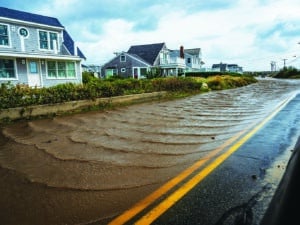
Houses in Falmouth look out on a road being flooded by a “bomb cyclone” storm in 2019. Seaside homes face increasing risks from storm surges and sea level rise as climate change continues.
A new report from Redfin finds that 21 percent of the of 2,000 Americans the company surveyed believe the increasing frequency or intensity of natural disasters, extreme temperatures and/or rising sea levels are hurting home values in their area.
A comparable share – 23 percent – expect one or more of these factors to hurt local housing values in the next five years, and 12 percent think values will be negatively impacted in the next five to 10 years. Just over a third (35 percent) of Americans believe these factors will never diminish home values where they live. Concern was most concentrated among younger respondents.
“Climate change is posing an increasingly large risk to homeowners. As storms, wildfires and rising sea levels render more areas undesirable in the coming years, housing values in those areas will decline. This means a growing number of homeowners will see a major source of wealth – their home equity – wiped away,” Redfin Chief Economist Daryl Fairweather said in a statement. “We may also see folks in at-risk areas choose to rent instead of own to avoid getting stuck with devalued properties.”
About a quarter of respondents aged 44 and younger believe home values in their area are already being negatively impacted by the increasing frequency/intensity of natural disasters, extreme temperatures and/or rising sea levels. That compares with 15 percent of participants aged 45 to 54 and 9 percent of participants aged 55 and older.
Seventeen percent of respondents living in the Midwest think climate change is negatively affecting housing values in their area, compared with 20 percent of respondents in the Northeast, 22 percent in the South and 23 percent in the West.
While the Midwest is warming up and experiencing greater precipitation in some areas, it hasn’t seen the sudden uptick in devastating natural disasters that other parts of the U.S. have. The West Coast had its most active fire year on record in 2020, with more than five million acres burning across California, Oregon and Washington, and homes in many wildfire-prone zip codes selling for a discount. In Texas, a massive winter storm in February 2021 left 111 people dead and millions without power. And residents of the Northeast may still have memories of disasters like Hurricane Sandy relatively fresh in their minds
“Homeowners are still getting their pipes repaired from the freeze. Some are still without water,” Ashley Vasquez, a Redfin real estate agent in Houston, said in a statement. “I had one home that was supposed to close a month ago, but the process has been delayed because of the storm. We now have to get the home reinspected and reappraised to assess whether the freeze impacted the value.”
While buyers are concerned about flooding and storms in Texas, many are overlooking these risks because there are so few homes for sale, Vasquez added.
More than a quarter (27 percent) of city dwellers think local home values are being negatively impacted by the increasing frequency/intensity of natural disasters, extreme temperatures and/or rising sea levels. That compares with 17 percent of respondents living in suburban areas and 16 percent living in rural areas.
“Cities tend to skew younger and more liberal, which is likely why they’re home to a larger share of people who are worried about the risks of climate change,” Fairweather said. “Many city leaders have committed to carbon-reduction plans that are much more ambitious than the proposals put forth by federal and state officials.”




 |
| 

